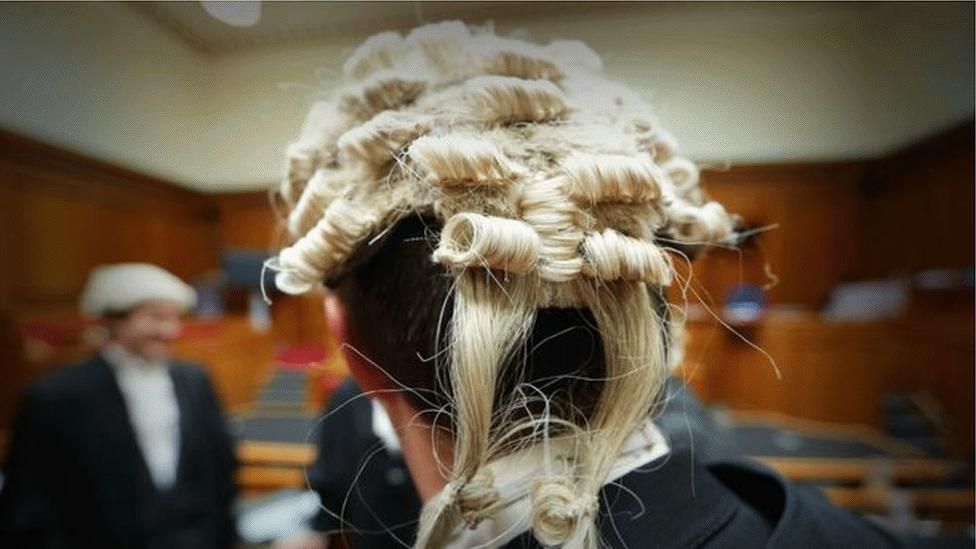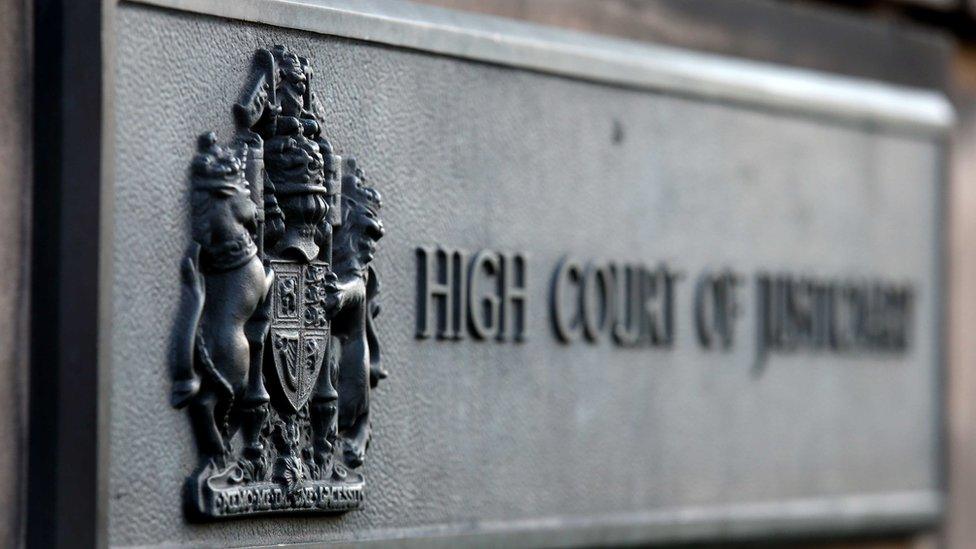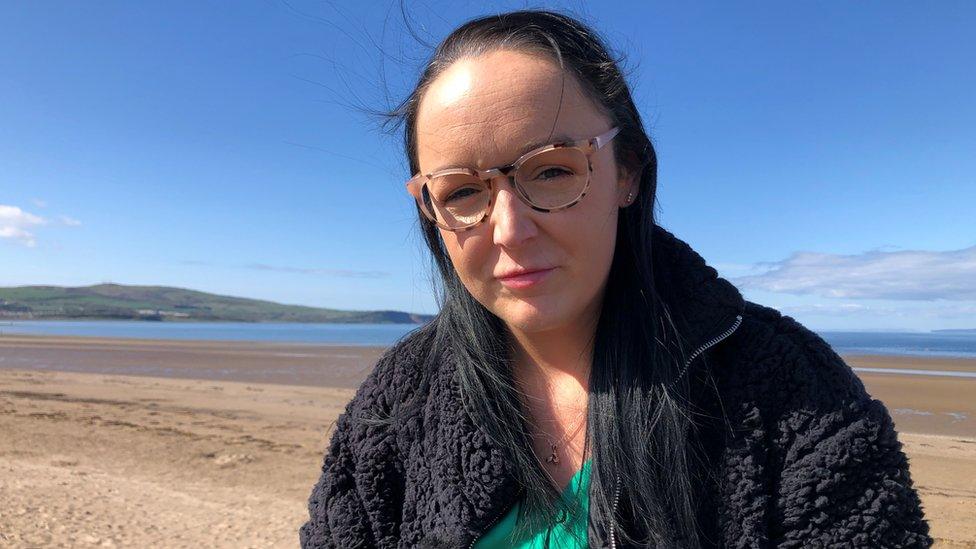Not proven verdict to be scrapped in Scottish courts
- Published

Some legal professionals oppose the scrapping of the not proven verdict
The controversial not proven verdict is to be scrapped in Scottish courts as part of sweeping reforms to the country's justice system, external.
The measures will also see the number of jurors in criminal trials reduced from 15 to 12.
And a pilot will be held that would see rape and attempted rape trials be held without a jury.
Not proven is one of three verdicts that can be returned in Scotland, alongside guilty and not guilty.
The implications of a case being found not proven are exactly the same as not guilty and the accused is innocent in the eyes of the law.
But there has been concern that it can be confusing for juries and the public.
Critics of the verdict also say it can stigmatise an accused person by appearing not to completely clear them and that it can fail to provide closure for victims.
However some legal experts believe it can offer additional protection to an accused person by helping to ensure that they will not be convicted if the jury has any doubts.
And the Law Society of Scotland has warned there could be an increase in miscarriages of justice if not proven is scrapped.

The proposals are largely aimed at improving how the justice system treats victims of sexual violence
Not proven is unique to Scots law, with other legal systems only having two possible verdicts rather than three, and discussions about whether or not to keep it have been going on for years.
The verdict can trace its roots back to the 17th Century, but despite being available in all criminal cases there is no definition of not proven, or the difference between it and a not guilty verdict.
A study published in 2019 found removing the not proven verdict might incline more jurors towards a guilty verdict in finely balanced trials.
It also highlighted inconsistent views on the meaning of not proven and how it differed from not guilty.
The general perception among the public is often that a "not proven" verdict suggests a sheriff or jury believes the accused is guilty, but does not have sufficient evidence to convict.

Rape and attempted rape cases are currently always held before a jury
The proposal to abolish the verdict is contained in a new bill published by the Scottish government which would see the most radical shake-up of the country's justice system in decades if it is passed.
The measures include reducing the number of people who sit on a jury from 15 to 12, which would bring Scotland into line with England.
At least eight of the 12 jurors will need to agree that the accused is guilty for them to be convicted rather than the current simple majority of eight out of 15.
A new specialist sexual offences court will be created and a pilot project will see rape and attempted rape cases being held without a jury, with a single judge deciding whether or not the accused is guilty.


The big surprise in these proposals is a change which could make it harder to get convictions.
A simple majority is required for a guilty verdict in a Scottish court, which currently means eight out of 15 jurors.
While the Scottish government is proposing that juries should be reduced to 12, the rule on majority verdicts will stay the same.
That means prosecutors will have to convince eight out of 12 people that they have proved their case beyond reasonable doubt.
Presumably this is being done to placate defence lawyers who see the abolition of not proven as the removal of a safeguard against miscarriages of justice.
This is the only measure in the bill which has not been welcomed by Rape Crisis Scotland. It says this could have a significant impact on convictions.

The move is aimed at increasing the country's low conviction rate for serious sexual offences.
Only about half of rape and attempted rape trials result in a conviction. The overall conviction rate in trials is about 90%.
Rape and attempted rape trials have also been far more likely to end in a not proven verdict that trials for other offences.
There were 2,176 rapes and attempted rapes reported to the police in 2020/21, but only 152 prosecutions and just 78 convictions.
'The jury was very intimidating'
Katie Johnston survived a brutal rape in Aberdeen's Union Terrace Gardens in January 2016, after a night out with friends.
Her attacker, Alasdair McDonald, was found guilty and sentenced to 10 years in jail.
She welcomed the introduction of judge-only trials in rape and attempted rape cases, and said this would have been "much less daunting" than giving evidence to a jury.
"Talking about my case in front of 15 members of the jury was very intimidating. You've got 15 faces looking at you," she said.

Rape survivor, Katie Johnston has welcome changes set out in the Criminal Justice Reform Bill
She noticed changes in body language and facial expressions from the members of the jury which made her feel like she had said "something wrong".
Ms Johnston also welcomed the decision to scrap the not proven verdict, and said she would have been "devastated" if that had been the outcome in her case.
Justice Secretary Angela Constance said that victims of sexual abuse "must be supported to have trust and confidence that the processes of justice will serve their needs, allow them to give their best evidence and support them in their recovery."
Rape Crisis chief executive Sandy Brindley welcomed the majority of the proposed reforms, which she said "could bring about a transformative change in improving legal responses to rape".
She said there was "overwhelming evidence" that jury members are influenced by "rape myths" - such as assumptions that victims would always fight back, their attacker would be a stranger, or that they would report the incident immediately.


The Scottish government tried to introduce judge only, or juryless trials during the Covid pandemic. But there was such an outcry the plan had to be scrapped.
This pilot will be no less controversial.
But ministers point out that the right to a fair trial does not necessarily mean the right to a jury trial.
In fact in 2019-20 just 16% of criminal cases were heard by a jury. 84% were less serious, or summary cases, which were dealt with by a justice of the peace or a sheriff.
The key factor at play here is conviction rates. They're around 88% for all crime, but only 43% for rape and attempted rape.
The pilot of single judge rape trials is still some way off, but it will see how effective they are and how they work in practice, rather than in theory, for complainers, the accused and their lawyers.

Ms Brindley added: "What we know is that many women in particular are being failed by the justice system and I have no doubt that guilty men are walking free. I think we need to do something about that."
Defence lawyer Tommy Ross KC challenged the assumption that there is something wrong with the conviction rate and warned of a possible backlash against the proposals.
He said: "The conviction rate should match exactly the number of cases which are proved beyond reasonable doubt and the people who work in the criminal justice system believe that that test has been met.
"If our judges have faith in our juries then I expect our judges to come out fighting for the jury system.
"It has been abolished in Russia, it was abolished in Nazi Germany. I don't expect the jury system to be abolished in Scotland."